What is the E2 Program?
The Empowered Educator Program (E 2) is an online curriculum that is aligned to the seven ISTE Standards for Educators. This online curriculum contains a pre-test, seven modules, and a post-test. The entire curriculum can be found in a Blackboard course, to which you will receive access once you enter the teacher preparation program. All teacher candidates in all programs will be given access to the E 2 curriculum.
The entire curriculum can be completed across 2-4 semesters, depending on your program of study. See the sections below to find out how the program will be paced.
To determine your background knowledge of digital pedagogy and the seven ISTE standards, you will first complete the Digital Pedagogy Evaluation, a 7-part test that can be completed online, at your own pace.
This diagnostic test is knowledge- and scenario-based, which asks you not just to know certain key terms, but also to be able to identify the best practices in a scenario. Each part of the test is 10 or 11 questions long, for a total of 72 questions.
You will take this test again once you complete the modules in order to determine how far your knowledge and skills have grown.
The program modules represent the curriculum created to support and grow your learning in digital pedagogy. Each of the seven modules are online and self-paced. While they can be completed in any order, we recommend you start with the Learner or the Citizen. The table below provides a description of each module, as well as the professional development rewards you gain from each of them.
| The Module | Objective | Assessment and PD Credit |
|---|---|---|
| The Learner | The teacher learner seeks to explore resources to improve practice and stay current with digital pedagogy research. | Completing the module with 80% success or better will earn you the Explorer Badge.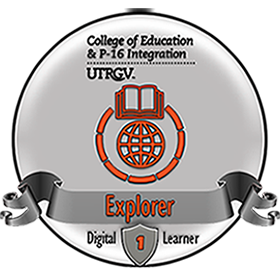 |
| The Leader | The teacher leader seeks to be an advocate of digital pedagogy to empower students in their learning. | Completing the module with 80% success or better will earn you the Advocate Badge.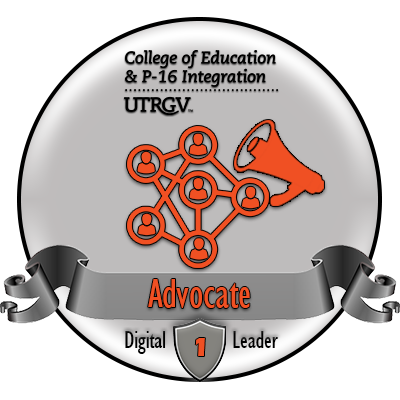 |
| The Citizen | The teacher citizen seeks to contribute positively in online environments and guide students to be contributors themselves. | Completing the module with 80% success or better will earn you the Contributor Badge.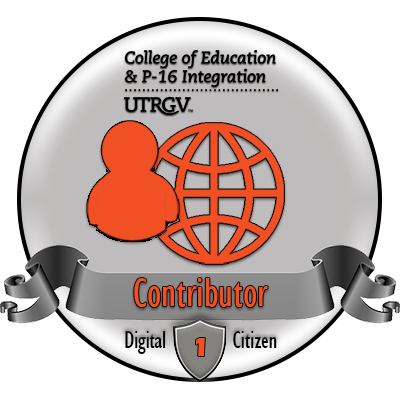 |
| The Collaborator | The teacher as co-learner seeks to partner with students and other colleagues to create real-world learning experiences through digital pedagogies. | Completing the module with 80% success or better will earn you the Co-Learner Badge.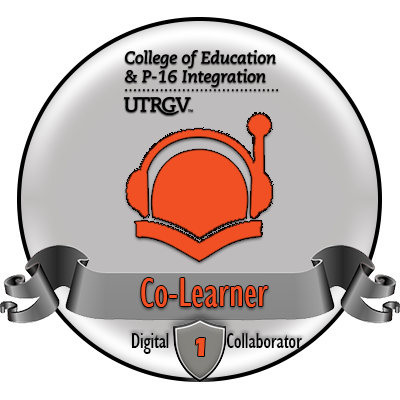 |
| The Designer | The teacher designer seeks to innovate teaching and learning through digital pedagogy instructional design that engages all students. | Completing the module with 80% success or better will earn you the Innovator Badge.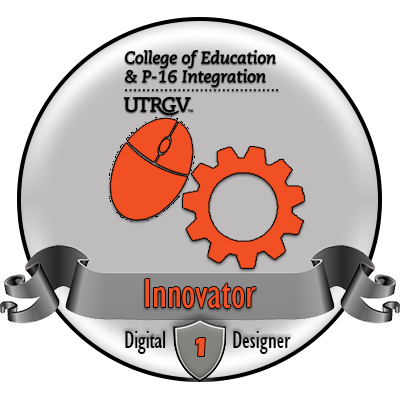 |
| The Facilitator | The teacher facilitator seeks to challenge critical and creative thinking through digital pedagogy and digital environments. | Completing the module with 80% success or better will earn you the Challenger Badge.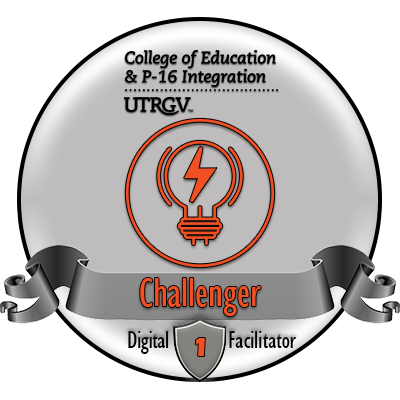 |
| The Analyst | The teacher assessor seeks to use data to investigate better ways of assessing students through digital pedagogy practices. | Completing the module with 80% success or better will earn you the Assessor Badge.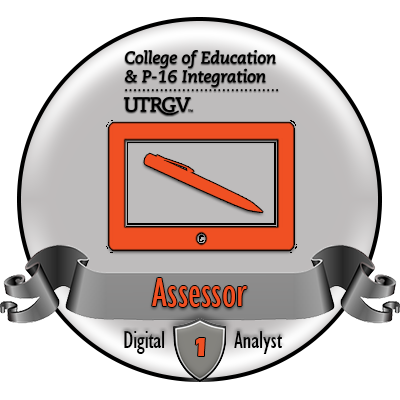 |
Empowered Educator Program Courses
Welcome to your future as an Empowered Educator!
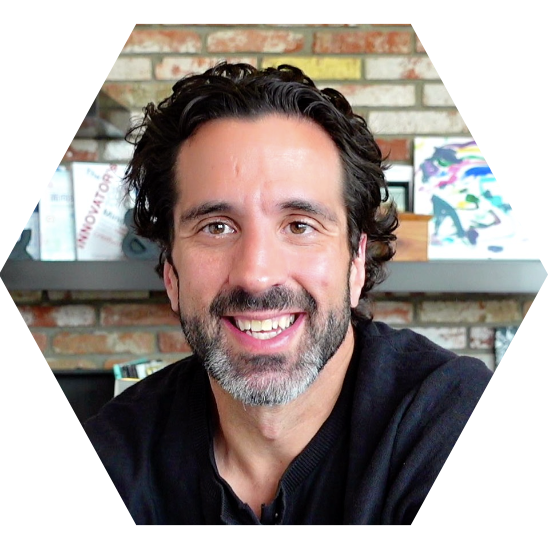
Why should I become an E2?
Teachers with digital tools can create learning experiences beyond what simple paper and textbook can accomplish. Watch the video below to understand what it means to become not just a teacher, but an empowered educator.
“We have unprecedented access to tools, to information, to interfaces. The question that digital pedagogy attempts to answer is: ‘So what? What do we do with them?’ – Lee Skallerup Bessette
The aim of the Empowered Educator Program for 21st Century Teaching is to help you answer these questions and prepare to answer them in your own future classrooms.
The Empowered Educator Program for 21st Century Teaching
The goal of the Empowered Educator Program (E2) is to help pre-service teachers develop the art of teaching with technology. The curriculum for this program has been created to support and reinforce the pedagogical knowledge and skills you will acquire from your courses, by making clear connections to the digital tools and digital methods of instruction. This is called digital pedagogy.
The focus of digital pedagogy is on transforming teaching and learning by leveraging digital tools for face to face, online—both synchronous and asynchronous—and blended learning. Digital pedagogy’s main focus is to guide educators in the critical selection of digital tools for the purpose of engaging students in varied and relevant ways to meet their learning objectives. Digital pedagogy is intentional, and student centered.
The Empowered Educator Program is a requirement of the Texas Education Agency (TEA). This requirement is intended to expand your learning of digital literacy, and your ability to teach using virtual instruction. Digital learning is no longer an optional add-on to your teaching. To be prepared for teaching, you must also be ready to do it online, face to face, or through a combination of modalities, including synchronous and asynchronous methods.
This statute also indicates the following: “instruction in digital learning, including a digital literacy evaluation followed by a prescribed digital learning curriculum.” After the pandemic, TEA has now also added “virtual instruction, virtual learning, digital literacy, and digital learning” to the statue.
The UTRGV College of Education Teacher Preparation Program now has the Empowered Educator Program for 21st Century Teaching that will help you meet and exceed these requirements.
he International Society for Technology in Education (ISTE) has been setting high standards for the use of technology and technology-supported methods in the classroom for nearly 45 years. In Texas, the ISTE Standards for Educators have been selected to help you develop the skills and methods of an empowered educator who can teach with digital tools.
These standards, however, are not just about the technology: they are about the teaching that is supported by technology.
“The educator section of the ISTE Standards provides a road map to helping students become empowered learners. These standards will deepen your practice, promote collaboration with peers, challenge you to rethink traditional approaches and prepare students to drive their own learning.” (ISTE Standards, https://www.iste.org/standards/iste-standards-for-teachers)
To read the full breakdown of the seven standards, click the link and video below.
Where can I find more resources?
The following resources are related to the use of Universal Design to design learning, both online and face to face.
Universal Design for Learning Guidelines
This resources provides an overview of the guidelines that need to be followed when using Universal Design to design instruction.
This video provides an explanation of the Universal Design guidelines in the previous website, and how they are applied in practice.
The following resource is related to data and assessment literacy for teachers.
Teaching as the Core Assessment Literacy Series
This series of webinars by noted assessment expert, Dr. Sue Brookhart, showcases how to design assessments for different purposes, from the traditional to the authentic.
This video provides an explanation of the Universal Design guidelines in the previous website, and how they are applied in practice.
These tutorials offer information on what constitutes a digital footprint, how we can create a positive one, and demonstrate appropriate digital citizenship.

